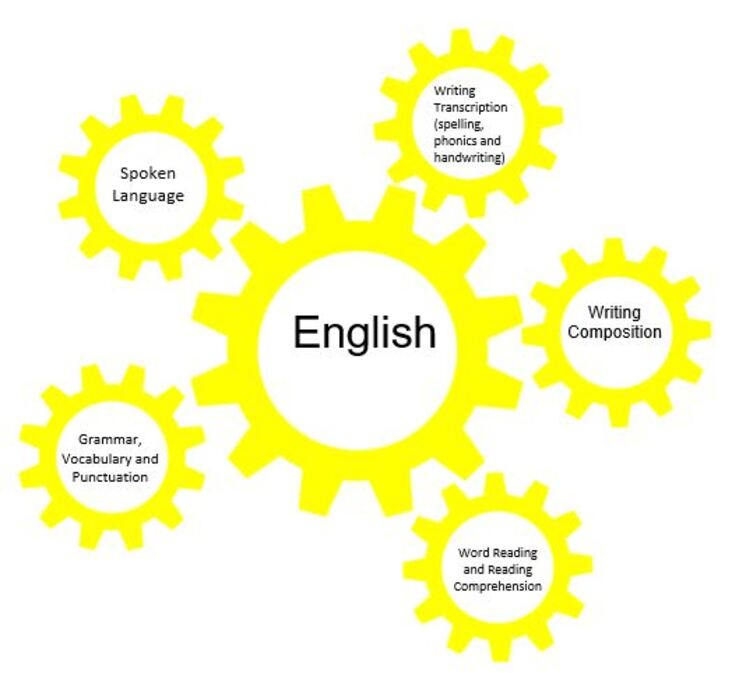English Curriculum
Our English vision
Our vision is for children to develop a deep understanding of literacy in its different forms. We want children to develop solid skills in sentence structure, punctuation, vocabulary, spelling and use these as a way to communicate effectively. Alongside this, the children will apply deduction, inference, and summarization skills to analyse texts, develop their vocabulary and adapt their spoken language in various contexts. Achieving this, they will write purposefully, read fluently and speak confidently. Ultimately, we aim for children to flourish with enthusiasm and love for literacy, expressing themselves confidently through writing various forms.

Key documents:
Progression and Planning Overviews:
Writing Overviews
Year 1 Writing OverviewWriting Progression Grids:
Non-Fiction Writing Progression
KS2 Spelling Progression Essential Spelling
Reading Overviews:
Reading Progression
Holy Trinity’s English Curriculum is broken into 5 distinct areas:
- Writing Transcription (spelling, phonics and handwriting)
- Writing Composition
- Word Reading and Reading Comprehension
- Grammar, Vocabulary and Punctuation
- Spoken Language
Writing Transcription (spelling, phonics and handwriting)
- Spelling: Holy Trinity uses the National Curriculum (Spelling Appendix 1) which provides the full overview. Below is a list of the specific schemes that break this process down further.
- Year 1: Spelling Phases 3-5 through the Little Wandles Scheme
- Year 2: Spelling Phases 6 and Spelling Rules through the Little Wandles Scheme
- Year 3: Essential Spelling
- Year 4: Essential Spelling
- Year 5: Essential Spelling
- Year 6: Essential Spelling
Writing Composition
- Each Year Group has Teacher Assessment Criteria document that outlines the expectations that each child should meet at the end of each year and children are assessed using these on a regular basis.
- Writing follows the school's 'Uplift' approach where children's work is assessed daily and subsequent lessons are planned and implemented to help fill gaps and misconceptions.
Word Reading and Reading Comprehension
Skilled word reading involves both the rapid deciphering of unfamiliar printed words (decoding) and the rapid recognition of familiar printed words. Underpinning both is the understanding that the letters on the page represent the sounds in spoken words. This is why phonics should be emphasised in the early teaching of reading to beginners (i.e. unskilled readers) when they start school.
Good comprehension draws from linguistic knowledge (in particular of vocabulary and grammar) and on knowledge of the world. Comprehension skills develop through pupils’ experience of high-quality discussion with the teacher, as well as from reading and discussing a range of stories, poems and non-fiction. All pupils must be encouraged to read widely across both fiction and non-fiction to develop their knowledge of themselves and the world they live in, to establish an appreciation and love of reading and to gain knowledge across the curriculum. Reading widely and often increases pupils’ vocabulary because they encounter words that they would rarely hear or use in everyday speech. Reading also feeds pupils’ imagination and opens up a treasure house of wonder and joy for curious young minds.
Year 1 and 2 follows the National Curriculum guidance.
Year 2 also use the reading interim statements to provide further specific tailoring of learning
The statements below provide Key Stage 2 teachers with a specific focus on areas of the Reading curriculum to focus on in Reading Comprehension lessons.
- Give / explain the meaning of words in context
- Retrieve and record information / identify key details from fiction and non–fiction
- Summarise main ideas from more than one paragraph
- Make inferences from the text / explain and justify inferences with evidence from text
- Predict what might happen from details stated and implied
- Identify / explain how information / narrative content is related and contributes to meaning as a whole
- Identify / explain how meaning is enhanced through choice of words and phrases
- Make comparisons within the text
- Grammar, Vocabulary and Punctuation
- Speaking and Listening
Grammar, Vocabulary and Punctuation:
- All year groups follow the grammar curriculum that is outlined in the National Curriculum.
- At Holy Trinity, we follow a repetitive and explorative process that allows children to embed key grammatical knowledge, identifying these in their own and given pieces of writing. The Holy Trinity 'steps' then provide a child-friendly approach that allows the children to review and access the skills that are appropriate to them at their age and stage of learning
Spoken Language:
- All year groups follow the National Curriculum expectations as outlined in the National Curriculum.
- We have focused days as spread throughout the year where the children have the opportunity to practise and perform pieces of work.

 Holy Trinity Church School
Holy Trinity Church School 


